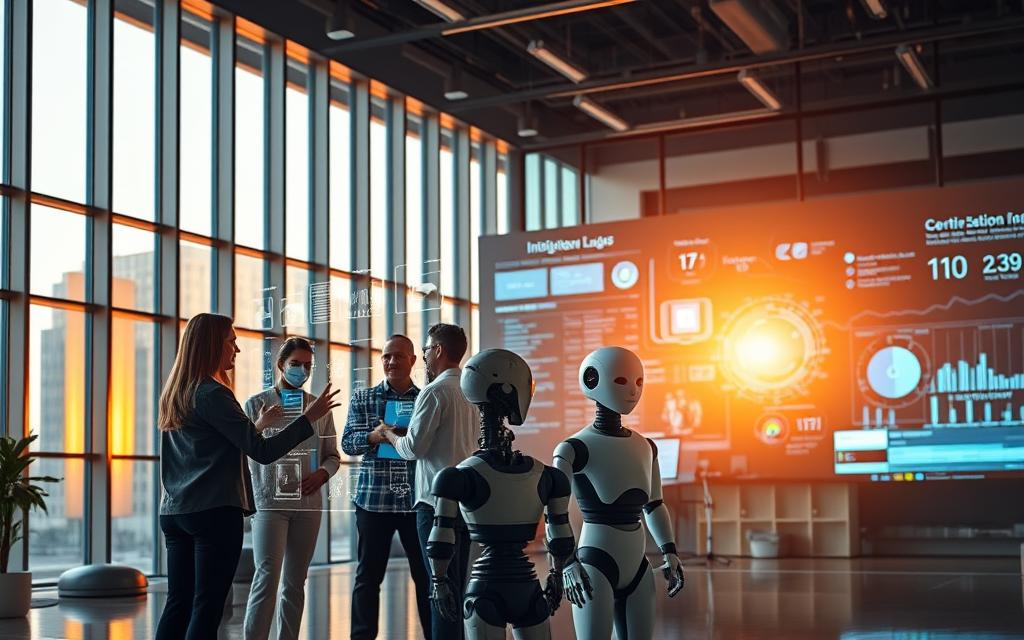Organisations across the UK now face a pivotal moment. Advanced machine learning systems have evolved from speculative tech jargon to practical tools reshaping commercial strategies. Recent data reveals the global market for these technologies could expand by 38.1% annually through 2030 – a staggering growth rate that reflects their growing indispensability.
Over three-quarters of firms already use or trial these solutions, with 83% prioritising them in strategic planning. This surge isn’t about replacing human effort but enhancing decision-making and operational efficiency. From predictive analytics to customer service automation, the applications redefine how companies create value.
The shift extends beyond mere process upgrades. It represents a fundamental reimagining of workflows, talent management, and competitive advantage. While adoption brings challenges – from ethical considerations to skills gaps – the commercial landscape increasingly rewards those embracing intelligent systems.
This technological evolution demands attention. Firms lagging in integration risk obsolescence as rivals harness smarter data interpretation and resource allocation. The question isn’t whether to engage, but how swiftly and effectively to act.
The Emergence of AI in Today’s Business Landscape
Commercial leaders increasingly view intelligent systems as operational cornerstones rather than optional upgrades. Over half of UK firms now deploy these tools in core functions, with adoption rates accelerating faster than most analysts predicted.
Key Statistics and Market Growth
Recent figures reveal 56% of organisations use machine learning to refine operations, while 51% apply it to combat cyber threats. Digital assistants support 47% of companies, streamlining tasks from scheduling to real-time analytics. Labour productivity could rise by 1.5% annually through AI integration – a critical advantage in competitive markets.
Globally, firms leveraging these technologies report 25% higher efficiency gains compared to traditional automation. Investment patterns confirm sustained confidence, with AI infrastructure spending projected to dominate corporate tech budgets by 2026.
Transformative Potential and Challenges
Adoption extends beyond efficiency gains. Nearly half of enterprises now employ predictive algorithms for inventory control and customer relations. However, implementation hurdles persist – 63% of UK managers cite skills shortages as primary barriers.
Ethical concerns around decision-making transparency and workforce adaptation require careful navigation. Successful firms balance rapid deployment with employee training programmes and governance frameworks. Those mastering this equilibrium position themselves for long-term market leadership.
what impact is artificial intelligence poised to have on business
Quantifiable metrics reveal machine learning’s profound influence on modern enterprises. Since ChatGPT 3.5’s 2022 debut, industries embracing these tools saw revenue per employee surge threefold compared to lagging sectors. This acceleration coincides with 56% higher wages for specialists navigating algorithmic systems – a talent premium doubling within 12 months.

Evidencing the Revolution with Data Insights
Operational benchmarks expose stark contrasts. Firms integrating predictive models achieve 18% faster decision cycles while reducing resource waste by 23%. A recent analysis of FTSE 350 organisations shows early adopters outpacing competitors in market share growth by 14 percentage points.
The skills revolution proves equally dramatic. Roles interfacing with neural networks require 66% more frequent upskilling than traditional positions. Forward-thinking companies now allocate 31% of training budgets to machine learning competencies, recognising their critical role in sustaining innovation.
Commercial leaders increasingly rely on diagnostic dashboards to track implementation success. One retail consortium’s report revealed organisations using real-time analytics achieved 27% higher customer retention rates. These measurable advantages cement intelligent systems as non-negotiable components of modern strategy.
AI Across Industries: Transformative Insights
Sector-specific innovations reveal machine learning’s versatility in solving distinct commercial challenges. From hospitals to high streets, intelligent systems now deliver measurable improvements in efficiency and outcomes.
Healthcare and Medical Applications
Clinical teams harness these tools to revolutionise patient care. Over 38% of UK providers now use algorithms for faster diagnoses and treatment plans. Remote monitoring systems reduce hospital readmissions by 17%, while AI-driven drug discovery accelerates trials by 40%.
Annual savings could hit $150 billion by 2026 through streamlined workflows and error reduction. Transcription services powered by neural networks now handle 92% of medical documentation, freeing staff for critical tasks.
Banking, Mining and Accounting Impact
Financial institutions deploy machine learning to combat fraud, with detection rates improving by 63%. Mining firms report 18x faster geological data processing, enhancing safety in hazardous environments.
Accounting solutions automate 78% of repetitive tasks like invoice matching. “These tools aren’t replacing accountants – they’re amplifying their strategic value,” notes a PwC analysis. Market projections suggest £125 million growth in UK accounting tech by 2028.
Construction and Retail Innovations
Builders achieve 50% productivity gains through real-time equipment monitoring. AI-powered site surveys reduce material waste by 29%, while predictive maintenance cuts downtime by half.
Retailers leverage hyper-personalisation engines to boost conversion rates. Recommendation systems account for 35% of online sales, driving the sector’s projected £16 billion valuation by 2026.
Enhancing Business Functions with AI
Operational landscapes are being reshaped as advanced tools transition from experimental to essential. Over 67% of UK enterprises report measurable productivity gains within six months of deploying these systems, according to recent TechUK analysis. This evolution centres on three critical areas: reallocating human capital, refining decision frameworks, and reimagining client interactions.

Task Automation and Operational Efficiency
Routine processes now face unprecedented transformation. Machine learning handles 58% of repetitive tasks in sectors like logistics and finance – from invoice processing to inventory checks. One retail consortium achieved 40% faster stock replenishment cycles through automated tracking systems.
These solutions free teams to focus on creative problem-solving and strategic priorities. A manufacturing case study revealed a 31% increase in engineering innovation after automating quality control workflows. Operational costs simultaneously dropped by 19% through predictive maintenance algorithms.
Data-Driven Decision Making and Customer Experience
Real-time analytics empower organisations to decode complex data streams. Financial services firms using AI-driven dashboards report 22% quicker risk assessments, enabling more agile investment strategies. “The speed and accuracy gains are rewriting our playbook,” notes a London-based fintech director.
Client expectations now drive technological adoption. Personalisation engines analyse browsing patterns to deliver tailored recommendations, boosting e-commerce conversion rates by 35%. Support chatbots resolve 68% of routine customer service enquiries within minutes – a value-add that strengthens brand loyalty.
These functional upgrades collectively establish new benchmarks for sustainable growth. Companies mastering this integration secure decisive advantages in today’s innovation-led markets.
The Future of Work in the Age of AI
Workplace dynamics face unprecedented transformation as cognitive technologies redefine traditional roles. Recent projections suggest 16% of current positions could vanish by 2025, while 9% emerge in fields like algorithm auditing and robotics maintenance. This dual reality demands strategic adaptation from both workers and employers.
Job Displacement Versus Job Creation
Goldman Sachs estimates suggest automation could displace 300 million roles globally. However, productivity gains from machine learning may generate £5.6 trillion in economic value by 2030 – potentially offsetting losses through new industries. McKinsey’s analysis of 800 occupations reveals 45% of tasks remain immune to automation, particularly those requiring human judgment.
Roles involving stakeholder management or expertise application show remarkable resilience. “The true challenge lies in reskilling workforces, not replacing them,” notes a recent parliamentary report. Forward-thinking firms already invest in transition programmes, with 62% prioritising redeployment over redundancies.
Role of Soft Skills and Augmented Capabilities
As algorithms handle technical tasks, human strengths gain prominence. Emotional intelligence and creative problem-solving now feature in 78% of UK job specifications – up from 43% in 2020. Leadership development budgets have doubled since 2022, reflecting the growing value of skills machines can’t replicate.
Successful enterprises combine technical training with communication workshops. One manufacturing consortium achieved 31% higher retention by pairing AI tool certification with conflict resolution courses. This blended approach prepares workers for collaborative futures where human insight directs machine efficiency.
Economic and Strategic Implications of Artificial Intelligence
Global economic frameworks are undergoing radical restructuring through technological integration. McKinsey’s latest report suggests these systems could inject $13 trillion into worldwide markets by 2030 – equivalent to 16% of current global GDP. This seismic shift demands strategic alignment from enterprises navigating both opportunities and complexities.

Boosting Productivity and Revenue Growth
Operational enhancements through machine learning now deliver measurable financial gains. The projected 1.2% annual GDP growth stems from three key drivers:
| Sector | Efficiency Gains | Revenue Impact |
|---|---|---|
| Manufacturing | 23% faster production | £18bn/yr savings |
| Retail | 35% conversion lift | £9.2bn new sales |
| Finance | 19% risk reduction | £4.7bn fraud prevention |
Early adopters report 31% higher profit margins than competitors. “The value lies in scaling insights beyond human capacity,” observes a Deloitte analysis of FTSE 100 firms.
Risk Management and Ethical Considerations
While 70% of companies plan AI adoption, 63% lack proper governance frameworks. Public concerns focus on data misuse (58%) and algorithmic bias (41%).
Recent surveys show 85% of UK stakeholders demand stricter safety protocols. Over four-fifths advocate increased spending on ethical assurance programmes. Successful implementations balance innovation with:
- Transparent decision trails
- Bias mitigation audits
- Workforce transition support
Regulatory bodies now prioritise standardised accountability measures. Firms aligning technological strategy with societal expectations secure lasting competitive advantages.
Digital Disruption Driving Business Innovation
Market leaders now harness technological disruption as fuel for reinvention. Over 74% of UK enterprises report accelerated product development cycles through machine learning integration, with 63% achieving faster time-to-market. This environment rewards those viewing digital shifts as springboards rather than threats.
Adapting to Rapid Technological Changes
Agile methodologies prove critical in navigating evolving landscapes. Firms adopting iterative development frameworks resolve operational bottlenecks 40% quicker than peers. Real-time data analysis enables 55% faster strategy pivots when market conditions shift.
Successful companies blend technological adoption with cultural flexibility. Cross-functional teams using predictive analytics achieve 31% higher innovation output. One FTSE 100 manufacturer reduced R&D costs by 28% through AI-powered prototyping tools.
The path forward demands proactive investment in adaptive capabilities. Prioritising employee upskilling and modular infrastructure unlocks sustained growth. Organisations embracing this mindset secure first-mover advantages in our rapidly transforming commercial world.
FAQ
How will AI-driven tools reshape healthcare and medical services?
Advanced solutions like machine learning enable faster diagnostics, personalised treatment plans, and predictive analytics. For instance, algorithms analyse medical imaging with 95% accuracy, reducing human error. Such innovations prioritise patient outcomes while streamlining operational workflows.
What cybersecurity risks accompany AI adoption in industries?
While automation enhances efficiency, reliance on interconnected systems increases vulnerability to data breaches. Businesses must integrate robust encryption protocols and real-time threat detection frameworks. Proactive strategies mitigate risks without compromising productivity gains.
Can AI-driven automation replace human roles in sectors like construction?
While robots handle repetitive tasks such as bricklaying or site inspections, human oversight remains critical for complex decision-making. The synergy between augmented capabilities and labour fosters safer environments and accelerates project timelines, driving sector-wide growth.
How do financial services leverage AI for customer experience?
Banks deploy chatbots for instant query resolution and use predictive models to detect fraudulent transactions. Tools like natural language processing personalise interactions, boosting client retention. Such trends highlight how technology bridges gaps between consumer expectations and service delivery.
What ethical considerations arise with AI implementation?
Bias in algorithms and data privacy concerns demand transparent governance frameworks. Companies like DeepMind and IBM Watson emphasise ethical AI development, ensuring accountability. Balancing innovation with regulatory compliance is pivotal for sustainable adoption across industries.
Which skills will workers need in an AI-augmented workforce?
Soft skills like creativity, emotional intelligence, and strategic thinking complement automated processes. Upskilling programmes focused on data literacy and system management prepare employees for hybrid roles, ensuring adaptability in evolving markets.
How does AI influence global economic competitiveness?
Nations prioritising AI research, like the United States and China, drive GDP growth through tech-centric strategies. Businesses harnessing analytics for supply chain optimisation or demand forecasting gain market advantages, reshaping traditional economic models.














